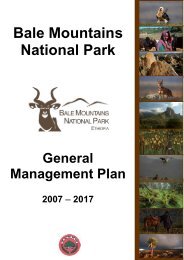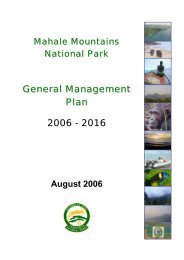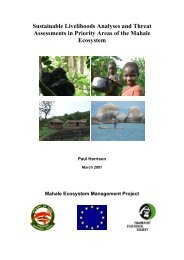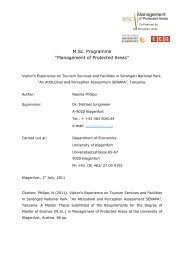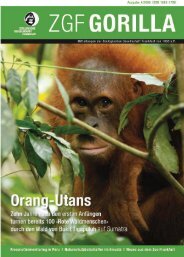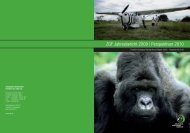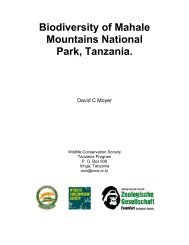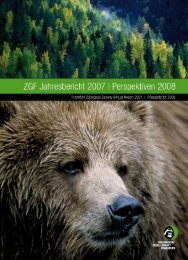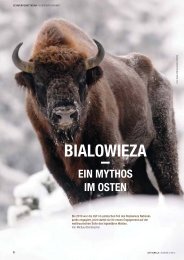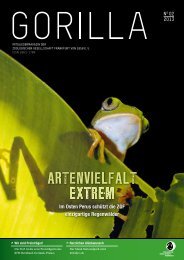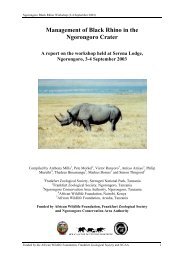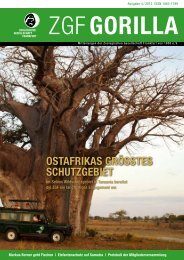Walia Special Edition on the Bale Mountains (2011) - Zoologische ...
Walia Special Edition on the Bale Mountains (2011) - Zoologische ...
Walia Special Edition on the Bale Mountains (2011) - Zoologische ...
Create successful ePaper yourself
Turn your PDF publications into a flip-book with our unique Google optimized e-Paper software.
Direct C<strong>on</strong>sumptive Use Value of Ecosystem Goods and Services in <strong>the</strong> <strong>Bale</strong><br />
<strong>Mountains</strong> Eco-regi<strong>on</strong>, Ethiopia<br />
Charlene Wats<strong>on</strong> 1* , E.J. Milner-Gulland 2 and Susana Mourato 1<br />
1 Department of Geography & Envir<strong>on</strong>ment, and Grantham Research Institute <strong>on</strong> Climate Change<br />
and <strong>the</strong> Envir<strong>on</strong>ment, L<strong>on</strong>d<strong>on</strong> School of Ec<strong>on</strong>omics and Political Science, Hought<strong>on</strong> Street, L<strong>on</strong>d<strong>on</strong>,<br />
WC2A 2AE, United Kingdom.<br />
2Centre for Envir<strong>on</strong>mental Policy, Divisi<strong>on</strong> of Biology, Imperial College L<strong>on</strong>d<strong>on</strong>,<br />
Silwood Park Campus, Buckhurst Road, Ascot, Berkshire, SL5 7PY, United Kingdom.<br />
*Email: c.wats<strong>on</strong>2@lse.ac.uk<br />
Abstract<br />
The <strong>Bale</strong> <strong>Mountains</strong> Eco-Regi<strong>on</strong> supports diverse ecosystem goods and services <strong>on</strong> which rural<br />
communities are highly dependent for <strong>the</strong>ir wellbeing. Envir<strong>on</strong>mental c<strong>on</strong>tributi<strong>on</strong>s to <strong>the</strong> household<br />
producti<strong>on</strong> of crops, livestock and forest products are not adequately represented in policy; hence<br />
<strong>the</strong> Eco-Regi<strong>on</strong> is being steadily degraded. We assess <strong>the</strong> ec<strong>on</strong>omic importance of ecosystem<br />
goods and services supporting agro-pastoral livelihoods. The direct c<strong>on</strong>sumptive use accruing to<br />
households annually is US$ 1157 from crop producti<strong>on</strong>, US$ 228 from livestock producti<strong>on</strong>, and<br />
US$ 407 from forest products. Household producti<strong>on</strong> decisi<strong>on</strong>s are opportunistic but also motivated<br />
by reaching a subsistence level of wellbeing. The mean annual direct c<strong>on</strong>sumptive use value is US$<br />
1791 irrespective of <strong>the</strong> household’s principal livelihood sources. Under current management, <strong>the</strong><br />
annual direct c<strong>on</strong>sumptive use value is US$ 366,439,518 across <strong>the</strong> Eco-Regi<strong>on</strong>’s rural populati<strong>on</strong>.<br />
This suggests that <strong>the</strong>se communities, heavily reliant <strong>on</strong> <strong>the</strong> envir<strong>on</strong>ment for <strong>the</strong>ir livelihoods,<br />
will be severely impacted by declining resource quality. The underlying ec<strong>on</strong>omic incentives and<br />
household dynamics of rural communities, in <strong>the</strong> c<strong>on</strong>text of local ecological c<strong>on</strong>diti<strong>on</strong>s, need to be<br />
c<strong>on</strong>sidered if c<strong>on</strong>servati<strong>on</strong> strategies are to be c<strong>on</strong>sistent with rural development goals.<br />
Introducti<strong>on</strong><br />
The rise in global populati<strong>on</strong> and wealth has not <strong>on</strong>ly increased <strong>the</strong> demand for ecosystem goods and<br />
services, but also necessitated that this demand is met from increasingly degraded ecosystems. In<br />
pursuit of higher levels of welfare, short-term demands are comm<strong>on</strong>ly met through <strong>the</strong> c<strong>on</strong>versi<strong>on</strong><br />
of natural ecosystems into human managed land-uses causing <strong>the</strong> loss of biodiversity. The loss of<br />
multiple comp<strong>on</strong>ents of biodiversity providing services fundamental to l<strong>on</strong>g-term human welfare, is<br />
predicted to exacerbate poverty levels and reduce food security globally (MA 2005). Thus, ecosystem<br />
c<strong>on</strong>servati<strong>on</strong> should be regarded as a tool to meet internati<strong>on</strong>al development goals.<br />
<str<strong>on</strong>g>Walia</str<strong>on</strong>g>-<str<strong>on</strong>g>Special</str<strong>on</strong>g> <str<strong>on</strong>g>Editi<strong>on</strong></str<strong>on</strong>g> <strong>on</strong> <strong>the</strong> <strong>Bale</strong> <strong>Mountains</strong> 181



